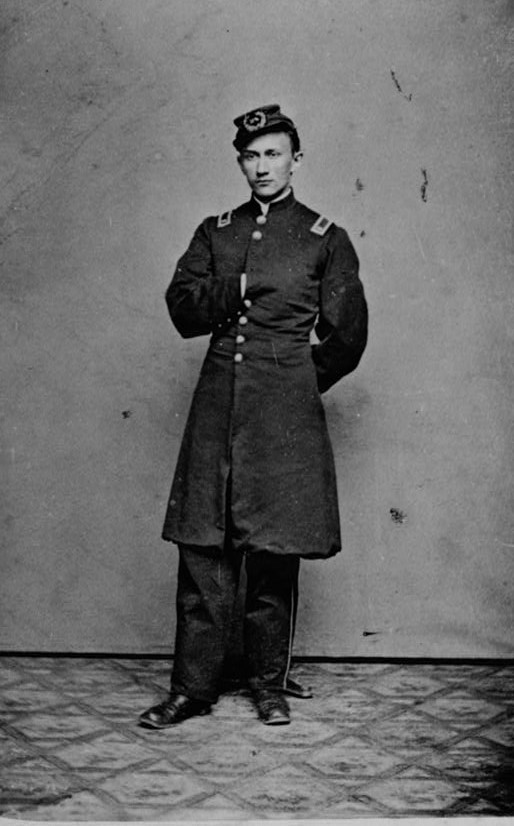William Harrison Lambert
William Harrison Lambert was born on May 9, 1842, in Reading, Pennsylvania, to James V. Lambert and Susan Keen. His father was a salesman in a dry goods store who owned about $1,000 of personal property by 1870. The family moved to Philadelphia, Pennsylvania, when he was very young, and he graduated from Central High School in 1859. He reportedly planned to become a lawyer, but the outbreak of the Civil War interrupted his studies. He enlisted in the Union army in Philadelphia, Pennsylvania, on August 18, 1862, and mustered in as a private in Company C of the 15th Pennsylvania Cavalry four days later. He was promoted in November 1862, becoming a first lieutenant in the 27th New Jersey Infantry.
The 27th New Jersey took part in the Battle of Fredericksburg in December 1862, and the army transferred the regiment to Kentucky in the spring of 1863. He mustered out on July 2, 1863, when the regiment’s 9-month term of enlistment expired. Later that month, however, he secured a position as first lieutenant in the 33rd New Jersey Infantry. The men took part in General William T. Sherman’s Atlanta campaign, the March to the Sea, and the Carolinas Campaign. Lambert was promoted to captain on January 16, 1864, and was breveted major in March 1865 for “gallant and meritorious conduct during the war.” He later received the Medal of Honor for “distinguished service during the war of the Rebellion.” He mustered out on July 17, 1865.
In April 1865, he expressed “sentiments of horror and of sorrow” at the news of President Abraham Lincoln’s assassination. The president, he wrote, “perished a martyr to the cause of liberty and right.” He doubted Andrew Johnson’s “capacity and fitness” for the presidency, but he hoped the new president would rise to the occasion. Lambert “believe[d] in the exercise of the most liberal charity to all the people of the South,” but he “believe[d] no punishment can be too severe to award to the traitors who have been the prominent leaders of the Rebellion.” Lincoln’s death had only hardened Lambert’s resolve: “I feel as though we should be false to ourselves, false to our dead, did we suffer those on whom rests the dread responsibility of causing this terrible war, to escape unharmed."
After the war, Lambert settled in Philadelphia and began working for a life insurance company. He married Herminia Van Haagen on October 15, 1874, and they had one son and three daughters. Lambert became a civic leader in his community, serving as President of the Department of Charities and Correction, a member of the Board of City Trusts, and a trustee of the Free Library of Philadelphia. He helped keep alive the memory of the Union cause, joining the Grand Army of the Republic, the Union League, and the Loyal Legion. He also became an avid collector of letters and artifacts connected to President Abraham Lincoln. According to one report, he owned several books from Lincoln’s personal library, a bookcase and table from Lincoln’s law office, and several chairs from the White House library. Lambert died in Philadelphia on July 1, 1912, and was buried in West Laurel Hill Cemetery.
Image: William H. Lambert (courtesy Library of Congress)
DATABASE CONTENT
| (598) | Lambert, William H. | 1842-05-09 | 1912-07-01 |
- Conflict Side: Union
- Role: Soldier
- Rank in: Private
- Rank out: Captain
- Rank highest: Captain
- Gender: Male
- Race: White
Documents - Records: 8
- (2061) [writer] ~ William H. Lambert to George D. Cox, 12 March 1862
- (2062) [writer] ~ William H. Lambert to George D. Cox, 24 September 1863
- (2063) [writer] ~ William H. Lambert to George D. Cox, 14 October 1863
- (2068) [writer] ~ William H. Lambert to George D. Cox, 23 February 1863
- (2137) [writer] ~ William H. Lambert to George D. Cox and Jesse Cox Jr., 24 May 1863
- (2266) [writer] ~ William H. Lambert to George D. Cox, 28 April 1865
- (2286) [writer] ~ William H. Lambert to George D. Cox and Jesse Cox Jr., 7 March 1865
- (2799) [writer] ~ William H. Lambert to George D. Cox, 23 March 1864
People - Records: 2
Regiments - Records: 3
SOURCES
1870, 1880, and 1900 United States Federal Censuses, available from Ancestry.com; Pennsylvania Veterans Card Files, 1775-1916, available from Ancestry.com; Philadelphia, Pennsylvania, Death Certificates Index, 1803-1915, available from Ancestry.com; John P. Nicholson, Register of the Commandery of the State of Pennsylvania, from April 15, 1865 to May 5, 1887 (Philadelphia, PA: n.p., 1887); In Memoriam: Major William H. Lambert (New York, NY: The Lincoln Fellowship, 1912); William H. Lambert to George D. Cox, 28 April 1865, DL0480, Nau Collection





